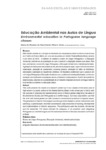Mostrar o rexistro simple do ítem
Educação ambiental nas aulas de língua
| dc.contributor.author | Ribeiro Alves, Maria do Rosário do Nascimento | |
| dc.date.accessioned | 2019-03-18T08:52:46Z | |
| dc.date.available | 2019-03-18T08:52:46Z | |
| dc.date.issued | 2015 | |
| dc.identifier.citation | Ambientalmente Sustentable, 2015, 20: 1103-1120. ISSN: 1887-2417 | es_ES |
| dc.identifier.issn | 1887-2417 | |
| dc.identifier.uri | http://hdl.handle.net/2183/22260 | |
| dc.description.abstract | [Resumo] Este trabalho propõe-se a divulgar os resultados de uma pesquisa desenvolvida em duas turmas da 3ª série do Ensino Médio, em uma escola pública do Distrito Federal/Brasília/Brasil, durante o ano letivo de 2012. O objetivo foi analisar o ensino de Língua Portuguesa e a Educação Ambiental, partindo-se da postulação de que é possível a integração dessas duas áreas. Para isso, abordamos o ensino de Língua Portuguesa, a Educação Ambiental e a interdisciplinaridade. A geração de dados para esta análise se deu através da pesquisa-ação, cujos instrumentos foram observação, aplicação de questionário, conversa gravada, produção de diário de itinerância, elaboração e aplicação de sequências didáticas. Os resultados evidenciam que é possível sim unir Língua Portuguesa e Educação Ambiental, com a prática da interdisciplinaridade, conforme a avaliação dos implicados na pesquisa: alunos, professora e pesquisadora. A partir da experiência desenvolvida, vislumbra-se a possibilidade de um trabalho integrado do ensino de língua materna e da temática ambiental na educação básica. | es_ES |
| dc.description.abstract | [Abstract] This work presents the results of a research carried out in two classes of the senior year of high school in a public school of the Federal District, Brazil, in the school year of 2012, with the purpose of analyzing the interdisciplinary study of textual genres integrating the areas of Environmental Studies and Portuguese as a mother tongue. Our basic assumption was that the work with textual genres can offer answers to sociocultural as well as to linguistic issues. The generation of data for this analysis was through action research, whose instruments were watching, a questionnaire, recorded conversation, daily production of roaming, development and implementation of didactic sequences. The participants were the students, the teacher and the researcher. The results indicate the adequacy of an academic work integrating Portuguese as a mother tongue and the transversal themes of the basic education curriculum in Brazil. | es_ES |
| dc.language.iso | por | es_ES |
| dc.publisher | Universidade da Coruña, Servizo de Publicacións | es_ES |
| dc.rights | Atribución-CompartirIgual 3.0 España | es_ES |
| dc.rights.uri | http://creativecommons.org/licenses/by-sa/3.0/es/ | * |
| dc.subject | Ensino de língua portuguesa | es_ES |
| dc.subject | Educação ambiental | es_ES |
| dc.subject | Interdisciplinaridade | es_ES |
| dc.subject | Linguistic education | es_ES |
| dc.subject | Environmental education | es_ES |
| dc.subject | Interdisciplinarity | es_ES |
| dc.title | Educação ambiental nas aulas de língua | es_ES |
| dc.title.alternative | Environmental education in Portuguese language classes | es_ES |
| dc.type | info:eu-repo/semantics/article | es_ES |
| dc.rights.access | info:eu-repo/semantics/openAccess | es_ES |
| UDC.journalTitle | AmbientalMente Sustentable: Revista científica galego-lusófona de educación ambiental | es_ES |
| UDC.volume | 20 | es_ES |
| UDC.startPage | 1103 | es_ES |
| UDC.endPage | 1120 | es_ES |
| dc.identifier.doi | https://doi.org/10.17979/ams.2015.02.020.1659 |






